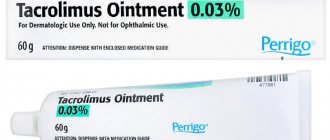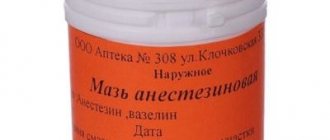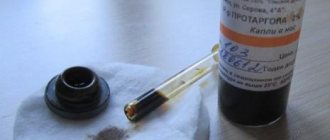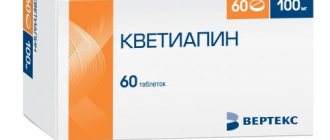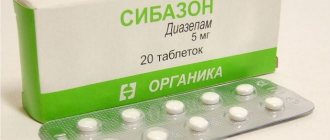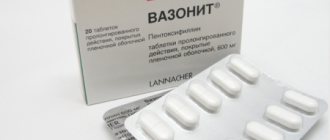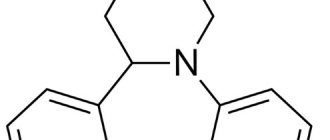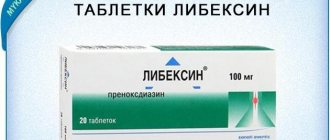There are restrictions during pregnancy
Has restrictions when breastfeeding
Not suitable for children
Has restrictions for older people
Has limitations for liver problems
Prohibited for use if you have kidney problems
Magnerot is a medicine based on the microelement magnesium, which is involved in many body processes, including metabolism. In addition to 32.8 mg of magnesium, the preparation also contains starch, cellulose, sodium cyclamate, talc, silicon dioxide, povidone K30 and lactose. Indications for taking Magnerot are:
- CVS pathologies caused by Mg deficiency in the body.
- Pain due to muscle spasms.
- Atherosclerosis.
- Arthritis.
- Protein metabolism disorder.
Such indications are justified by the ability of Mg to restore myocardial contractile activity, normalize metabolism and inhibit neuromuscular transmission. Magnesium also reduces the impact of stressful situations on the human body. The drug is contraindicated for people with calcium deficiency in the body, since Mg is its natural antagonist.
Magnerot
Contraindications also include urolithiasis, bradycardia and renal dysfunction. Magnerot is a fairly expensive drug, especially considering that it must be taken for at least 6 weeks. In view of this, many patients are forced to look for cheap analogues - substitutes for Magnerot in structure or action.
Compound
“Magnerot” contains orotic acid (a vitamin-like substance that affects metabolism and stimulates the growth of living organisms), which ensures cell growth and also takes part in metabolism. In addition, potassium orotate is needed for the fixation of magnesium on adenosine triphosphoric acid (ATP) in the cell and the manifestation of its action.
The cost of the drug "Magnerot" varies from 220 to 580 rubles. Sold in pharmacies in the form of tablets of 500 milligrams.
Pharmacological properties
Pharmacodynamics
Magnerot is a medicine that contains magnesium orotate as an active substance. Magnesium is an essential macronutrient necessary for many energy processes, participating in the metabolism of fats, carbohydrates, proteins and nucleic acids, as well as in the process of neuromuscular excitation (inhibits neuromuscular transmission).
Magnesium is a natural physiological calcium antagonist. It is necessary for the normal functioning of myocardial cells, since it takes part in its contractile function.
In stressful situations, the body loses large quantities of free ionized magnesium, so additional intake of this macronutrient helps increase resistance to stress.
Due to magnesium deficiency, the development of neuromuscular disorders (sensory and motor hyperexcitability, paresthesia, convulsions), psychological changes (hallucinations, confusion, depression), cardiovascular diseases (tachycardia, ventricular extrasystole, increased sensitivity to cardiac glycosides) is possible. A lack of magnesium in pregnant women can lead to toxicosis and premature birth.
Magnerot contains magnesium in the form of orotate. Orotic acid salts are involved in the metabolic process and are necessary for the fixation of magnesium on the angiotensin-converting enzyme in the cell and for the manifestation of its action.
Pharmacokinetics
Approximately 35–40% of the administered dose of the drug is absorbed. The presence of orotic acid salts in Magnerot helps improve the absorption of magnesium.
Hypomagnesemia stimulates the absorption of magnesium ions.
The drug is excreted by the kidneys. Excretion increases when there is an excess of magnesium in the body and decreases when there is a deficiency.
Contraindications
Like any other drug, Magnerot has a number of limitations:
- hypersensitivity to the components included in the drug;
- renal dysfunction;
- urolithiasis (urolithiasis);
- predisposition to the formation of phosphate stones;
- liver cirrhosis with ascites (a chronic disease accompanied by irreversible replacement of parenchymal liver tissue with fibrous connective tissue or stroma);
- hypolactasia (lactose intolerance);
- lactase deficiency;
- chronic diarrhea syndrome;
- age up to eighteen years.
Indications for use. Contraindications. Overdose
The drug is prescribed for the treatment of the following diseases:
- Arteritis.
- Myocardial infarction.
- Atherosclerosis.
- Chronic heart failure.
- Angina pectoris resulting from a lack of magnesium.
- Arrhythmia.
- Spasmodic urge in muscle tissue.
Contraindications
If you have the following symptoms, use of Magnerot is prohibited:
- Impaired renal function.
- Urolithiasis disease.
- Predisposition to the appearance of stone formations.
- Cirrhosis of the liver.
- Hypersensitivity and allergy to the composition of the drug.
In addition, the drug is contraindicated in patients with lactose intolerance due to its presence in small quantities.
Magnesium orotate is widely used in cardiology, but this substance can also enhance skin regeneration processes. Scientists have established a relationship between magnesium and the condition of connective tissue.
Admission rules:
- The average dose of Magnerot is 2 doses three times a day for a week.
- After – 1 dose 2 or 3 times during the day.
- In case of urgent need, the drug can be used for a long time - up to 6 weeks or more.
- For convulsive spasms, the dose is 2-3 pills before bedtime.
- The drug should be taken orally before meals. In this case, it is necessary to wash down the dose with plenty of water.
Overdose
Special cases of exaggerated use of the drug Magnerot have not been established.
With an increased content of magnesium in the circulatory system, the following symptoms may occur:
- Vomiting and discharge.
- Diarrhea.
- Stopping the heart muscle.
- Slowing down the body's reactions.
- Decreased blood pressure.
- Coma.
To treat these symptoms, rehydration, hemodialysis and forced diuresis are recommended.
Peculiarities
Magnerot can be taken for a long time. It must be remembered that the following points can lead to magnesium deficiency in the body:
- disturbances in the functioning of the stomach and intestines;
- eating foods with a small content of the required element;
- pathological addiction to drinking alcohol, as well as the presence of mental disorders (due to decreased reabsorption of magnesium in the renal canals and increased excretion of magnesium from the body);
- taking certain medications (for example: oral contraceptives, diuretics, muscle relaxants, glucocorticoids, insulin);
- the patient’s well-being, which requires increased magnesium intake (stress, pregnancy);
- hypodynamia (impaired body functions of the musculoskeletal system, blood circulation, breathing, digestion).
Pharmacodynamics and pharmacokinetics
The chemical feature of magnesium orotate is that it is metabolized disseminated, that is, the drug is absorbed in different ways. The largest amount is in a free, ionized state in the systemic bloodstream and is excreted along with urine by the kidneys. About 30 percent of magnesium salts bind to blood plasma proteins, which prolongs the presence of the drug in the body. 10-15 percent accumulates in the form of salts in bone formations or intracellular spaces, where they are included in compounds with DNA, RNA and ATP.
Orotic acid is metabolized to a greater extent in the liver. With its help, uridine monophosphate is obtained, which is then part of the intermediate synthesis of pyrimidines. Thus, the biologically active component of the drug can be excreted in three ways:
- through the intestines;
- kidneys;
- sweat glands.
It should be noted that Magnerot is a very active drug. The main active ingredient penetrates the blood-brain and placental barrier relatively easily. Magnesium orotate is also detected in breast milk during lactation.
Interaction with other drugs
When taking Magnerot simultaneously with medications that contain iron, sodium fluoride and tetracyclines, the absorption of the latter may be reduced. Therefore, it is necessary to take medications at intervals of two to three hours.
These medications include:
- oral contraceptives;
- diuretics (“Furosemide”, “Torasemide”, “Bumetanide”, “Piretanide”, “Uregit”, watermelon, melon, cucumbers, pineapple);
- relaxants (drugs used to treat osteochondrosis);
- glucocorticosteroids (a substance of natural or synthetic origin from a subclass of adrenal hormones);
- insulin reduces the effect of the drug.
Overdose
With normal liver function, taking Magnerot does not cause intoxication. The drug can provoke botulism in kidney and liver diseases. An overdose can occur as a result of an increased concentration of magnesium in the blood. Symptoms of poisoning:
- low blood pressure;
- nausea;
- diarrhea;
- vomit;
- depressive disorder;
- coma;
- anuria (a clinical symptom that is manifested by the complete absence of urine in the bladder and, as a consequence, the cessation of its release from the urethra).
Therapy:
- oral rehydration (re-saturation of a previously dehydrated body with water);
- detoxification method, which is based on the accelerated removal of toxins from the body by increasing the volume of urine produced.
In case of renal failure, it is necessary to use hemodialysis (a method of blood purification for acute and chronic renal failure) and peritoneal dialysis (one of the methods of blood purification that is used for impaired renal function).
Pharmacological effects
Magnesium is an essential trace element in the human body. It is needed for many energy and metabolic processes, as well as for the full conduction of nerve impulses.
The microelement is of particular interest in its natural physiological interaction with calcium molecules. In addition, magnesium tends to participate in the activity of myocardiocytes. It controls the contractility of myocardial tissue.
For example, under severe stress, the need for the microelement magnesium increases, and therefore much more of it must be supplied. A deficiency will provoke neuromuscular failure - convulsive chaotic contractions, paresthesia. Against the background of hypomagnesemia, depression, other changes in consciousness, as well as hallucinations are observed. Cardiovascular pathologies, for example, extrasystole, may also worsen. In women, a lack of magnesium contributes to increased toxicosis, as well as premature, sudden birth.
Magnerot tablets: instructions for use
Analogues and the drug itself can be taken with the simultaneous use of several drugs (one of which improves the effect of the other) and for preventive purposes of the following diseases:
- Myocardial infarction.
- Angina pectoris (a clinical syndrome characterized by a sensation or feeling of discomfort in the chest).
- CHF.
- Cardiac arrhythmia, which can be caused by magnesium deficiency (a pathological condition in which there is a disturbance in the rhythm and sequence of heart contractions).
- Pain syndrome and muscle spasms.
- Angiospasm (this is a narrowing of blood vessels, capillaries and small arteries, leading to disruption of tissue metabolism and blood circulation).
- Atherosclerosis (chronic artery disease of the elastic subtype, which occurs as a result of lipid metabolism disorder, which is characterized by the formation of cholesterol plaques).
- Blood vessel disease.
- Lipid metabolism disorder (a disorder in the process of production and breakdown of fats in the body, which occurs in the liver and adipose tissue).
Indications
Magnerot and its analogues may be prescribed in the following cases:
- myocardial infarction;
- chronic heart failure;
- magnesium-dependent arrhythmia;
- angina pectoris;
- muscle spasms;
- essential hypertension;
- blood pressure surges;
- diabetic retinopathy and angiopathy;
- atherosclerosis;
- hyperlipidemia;
- cachexia;
- neurovegetative disorders.
Magnerot and its analogues are also used to improve stress tolerance, both physical and mental.
"Magnerot": reviews
Analogs and the drug itself have received favorable reviews from doctors; this has been proven by its increased effectiveness in the treatment of cardiac dysfunction, in the elimination of muscle spasms and tremors. It helps with the unpleasant symptoms of premenstrual syndrome (irritability, migraine, depression), and reduces an elevated emotional state.
There are negative responses, but there are much fewer of them than positive ones. Their reason is adverse reactions. Some patients claim the low effect of the drug. A large number of reviews about the drug Magnerot during pregnancy are good, which is explained by its increased effect in eliminating the following symptoms while expecting a baby:
- hypertonicity (impaired muscle tone of the body, which is expressed in muscle overstrain);
- risk of miscarriage;
- pain in the lower abdomen;
- lower back pain.
The drug "Magnerot" is also prescribed to pregnant women for complications that can manifest as edema, high blood pressure, and tremor of the upper and lower extremities. Magnesium is also allowed to be used for edema from the fourth to eighth months of pregnancy. In the first case (with gestosis), the medicine helps to cope with:
- nausea;
- swelling.
According to the instructions and reviews, “Magnerot” with analogues helps improve uteroplacental blood circulation, increasing the quality of life of a woman during pregnancy, which allows her to carry a child to forty weeks.
Reviews about Magnerot and cheap Russian analogues are only positive. Generics are used to eliminate the lack of magnesium in the body:
- "Magnesium Diasporal 300."
- "Magnistad".
- "Panavital".
- "Vitrum forte Osteomag".
- "Magnesia".
- "Magne B6".
- Magne B6 forte.
- "Kudesan with potassium and magnesium."
- Magnelakt.
- "Biolectra Magnesium Direct 300."
- "Magnelis B6".
- "Briqueza".
- "Miorelaxil".
- "Magwit".
- "Orocomage."
- "Doppelhertz Active Magnesium B6".
- "Mersil."
- "Asparkam."
Characteristics of the drug
The medicine was created by the German pharmaceutical company Verwag Pharma, which produces and distributes various medicines around the world.
The drug is a round tablet. There is a mark on both sides of the product - a straight depression in the center. There is also a chamfer on one of the sides. The drug has a white color, perhaps a whitish and light milky tint.
The only active ingredient in the drug is magnesium orotate. Here it is used in the form of a dihydrate. 1 tablet contains about 500 mg of the component - a dose that covers the daily requirement of the element for an adult.
The composition also includes various excipients (talc, silicon dioxide, microcrystalline cellulose) that maintain the properties of magnesium orotate, give the tablet its shape, and protect it from accidental damage and negative environmental influences.
The medication is prescribed for severe symptoms of magnesium deficiency. Among them are:
- lack of coordination;
- deterioration of the nails (they become thin and break easily);
- constant feeling of fatigue;
- intense hair loss;
- abdominal discomfort, feeling of nausea, vomiting;
- dizziness;
- convulsions;
- sudden mood swings.
The drug saturates the body with magnesium, which, in turn, activates all its components. Thanks to it, mitochondria, which produce energy, begin to function more efficiently. This, in turn, allows other organs to work at full capacity and carry out all the processes necessary to maintain life.
Without magnesium it is impossible to imagine the occurrence of enzymatic reactions, since it is one of their activators. A sufficient amount of the element in the body accelerates the metabolism of substances such as nucleic acids, proteins, carbohydrates.
Magnerot, whose cheap analogues are sometimes no less effective, is absorbed into the body by 30–40%, depending on the degree of magnesium deficiency. The kidneys are responsible for excreting the active substance.
Moreover, the amount of the component excreted in the urine largely depends on the body’s needs for it. So, if a person lacks magnesium, most of it will spread through the blood to various systems and excretion will be minimal. If there is an excess of an element, its scale, on the contrary, will increase.
What is better “Magnerot” or “Magne B6”?
"Magne B6" is considered a direct analogue of "Magnerot", both drugs have a similar spectrum of action, but differ in structure.
The Magnerot preparation contains only magnesium compounds, and Magne B6, in addition to it, also contains vitamin B6 (pyridoxine). Both medications are intended to compensate for magnesium deficiency in the human body, especially when the deficiency of this element increases:
- in stressful situations;
- during physical and mental stress;
- during the period of bearing a child.
Magne B6 is not a cheap analogue of Magnerot. If there is a need to prevent magnesium deficiency during times of increased need for it, then either of the two medications can be given preference. Both drugs help eliminate:
- calf night cramps;
- muscle spasms;
- increased excitability;
- nervousness;
- premenstrual syndrome.
If there is a need to take magnesium to eliminate heart disease, a persistent increase in blood pressure, migraines, increased sweating, numbness of the extremities, then it is better to opt for the drug Magnerot, since this medicine is suitable specifically for the treatment of cardiovascular disorders.
The following medications are considered cheaper Russian analogues of Magnerot:
- "Vitrum Mag."
- "Magnelis B6".
- "Magnesium plus B6".
"Vitrum Mag" is a combined medication that regulates calcium metabolism. Replenishes the deficiency and corrects the exchange of Ca and magnesium. Takes part in the creation of bone tissue, conduction of nerve impulses and maintenance of myocardial function. Replenishes energy metabolism, normalizes blood clotting and muscle contractility. Magnesium increases calcium absorption and prevents the formation of calcium oxalate stones. The cost of the drug is approximately from 370 to 480 rubles.
List of cheap analogues of Magnerot:
- “Asparkam” is a Ukrainian-made drug that replenishes the lack of magnesium in the body. The cost of the medicine varies from 50 to 130 rubles. Available in the form of tablets and solution for injection.
- "Panangin" - available in tablet form, used for heart failure, as well as after myocardial infarction. The drug also increases the effect of glycosides. The price of “Panangin” (60 tablets) is 370 rubles.
- "Magvit" - a Belarusian-made medicine is one of the cheap analogues of "Magnerot". The drug helps eliminate sleep problems, relieves anxiety and seizures. Produced in capsule form. The cost of Magvit is from 200 to 230 rubles (30 tablets).
Belarusian funds
Among the Belarusian substitutes for Magnerot, Magvit can be noted, the active substances of which are magnesium citrate and pyridoxine. It also contains the following auxiliary components:
- potato starch;
- lactose;
- magnesium stearate.
Magnerot is available in the form of yellow capsules.
Shell includes:
- glycerol;
- gelatin;
- Propylparaben;
- sodium lauryl sulfate;
- nipaginj;
- purified water;
- dye.
Domestic analogues
Magnelis B6 is a slightly more expensive generic Magnerot, which contains two active components: magnesium and vitamin B6. The drug is prescribed for a deficiency of this element. The average duration of treatment is no more than thirty days. Caution should be exercised if you have diabetes, as the tablets contain sucrose. Prohibited for patients with renal failure, under the age of 6 years only as prescribed by a doctor. Approved for use during pregnancy. Side effects manifest themselves in the form of nausea, vomiting, allergic reactions. The cost of the drug varies from 250 to 330 rubles. "Magnelis B6" is one of the cheap analogues of "Magnerot".
"Magnesium plus B6" is a complex medicine based on B vitamins in combination with mineral trace elements. The drug is available in the form of white effervescent tablets. The medicine has a slight specific odor. Sold in tubes of ten pieces. The active components of this drug are multivitamins and mineral salts.
"Magnesium plus B6" is used during pregnancy only as prescribed by a doctor. Magnesium passes into breast milk, so it is necessary to avoid taking the drug during lactation. The cost of the drug varies from 310 to 450 rubles.
Cheap analogues and substitutes for the drug Magnerot: list with prices
Magnerot is a drug prescribed for the prevention and replenishment of magnesium deficiency in the body.
Magnesium is an essential trace element that is involved in the life of cells in the human body.
Contains:
- In the tissues of the nervous system.
- In the tissues of the muscular system.
- In the bones.
- In the brain.
- In plasma.
The main cause of magnesium deficiency is:
- Nutrition.
- Lifestyle.
- Taking medications.
Note! A heart attack at 35-45 years of age most often occurs due to a lack of magnesium. A magnesium level reduced by half can be fatal.
Magnerot's medication contains an active ingredient, such as magnesium orate, which promotes the absorption of the drug in different ways.
Indications for prescribing this medicine are heart failure, arrhythmia, atherosclerosis, and as a preventative measure it is prescribed for coronary heart disease.
The effectiveness of this medicine helps the body resist stress. Approved for use during pregnancy and lactation.
Has side effects:
- Diarrhea.
- Allergic reactions.
- Unstable chair.
Release form is only in the form of round tablets, white. Prices in Russia average 240.00-340.00 rubles for 20 tablets, 530.00-680.00 rubles for 50 tablets.
Analogues are medicines that are identical in composition to the originals and have the ability to treat similar diseases.
There are inexpensive synonyms for unadvertised drugs, where the properties and active substance are similar - called generics. Almost every drug has its own modern analogues.
IMPORTANT! The effectiveness of close substitutes may not correspond to genuine products - this depends on the credibility of the manufacturer, purification properties and compliance with production technology.
A wide range of medicines such as Magnerot allows you to select cheap analogues of the drug, as well as imported analogues from countries of different production.
Depending on the price range, synonyms of domestic manufacturer, Ukrainian production, and Belarusian are distinguished.
Russian-made analogues
| Name | Price in rubles | About the drug |
| Magnelis B6 | 240.00 – 360.00 rubles No. 90 | The best among similar drugs, vitamins and minerals. Prescribed for magnesium deficiency in the body. The medicine contains the active ingredient magnesium lactate and auxiliary ingredients – sucrose. Prohibited for patients with renal failure, children under 6 years of age only as prescribed by a doctor. Allowed during pregnancy. Side effects manifest themselves in the form of nausea, vomiting, allergic reactions. |
| Magnesium Plus B6 | 310.00 – 410.00 rubles No. 50 | Replenishes magnesium deficiency. Contraindicated in children under 6 years of age, patients with kidney disease, lactose deficiency and lactose intolerance. The main side effects are diarrhea, vomiting, nausea, allergic reactions. There are no analogues of this medicine. |
Ukrainian substitutes
| Name | Price in rubles | About the drug |
| Asparkam | 35.00-48.00 rubles No. 50; 103.00-128.00 rubles No. 56; 57.00-69.00 rubles No. 10, 5 ml; 81.00-103.00 rubles No. 10, 10 ml; | Prescribed for heart disease, heart rhythm disturbances, and the period after a heart attack. Available in the form of tablets, solutions for injections, as well as solutions for infusions. It has a huge list of contraindications. Use during pregnancy and infants is allowed only strictly as prescribed by a doctor. Close substitutes for asparkam include aspangin, pamaton, panangin forte, Berlin-Chemie. Side effects from the drug are fatigue, dizziness. The medicine is in demand and often prescribed. The cheapest analogue of Magnerot. |
| Panangin | 352.40 rubles No. 60 | Indications: for heart failure, condition after myocardial infarction. Additional therapy - increasing the effectiveness and improving the tolerability of glycosidones. Available in tablet form and as a solution for injection. It is used during pregnancy and lactation, but only in the form of injections. It also has many analogues, such as Pamaton, Asparkam. |
Belarusian substitutes
| Magwit | 201.00-229.00 rubles No. 30 capsules | Indications: with magnesium deficiency in the body, anxiety, sleep disturbances, convulsions. Release form: capsules. The drug is well tolerated. Contraindications: childhood, lactation, renal failure. |
Table of pros and cons of inexpensive drugs:
| pros | Minuses |
| 1. Price | 1. Produced with cheap auxiliary components |
| 2. Almost impossible to counterfeit | |
| 3. The therapeutic effect is the same |
The undeniable advantage of analogues is low prices since there are no costs for development, clinical research, and experimental use.
The cost may also be affected by other characteristics, for example, packaging material, prestige of the organization, packaging design.
Directions for use for analogues are sometimes printed on thicker paper; the tablets are packaged in a paper plate rather than in a jar.
However, quality does not depend on these criteria, but acts as an additional way to attract buyers.
The quality of domestically produced analogues does not always correspond to foreign analogues, so it is impossible to say unequivocally which close substitutes are better.
How to choose the right analogue? When choosing close substitutes for the desired drug, it is best to consult a specialist who will help you make the right choice.
Source: https://womans7.com/analogi/magnerot-deshevyie-spisok.html
